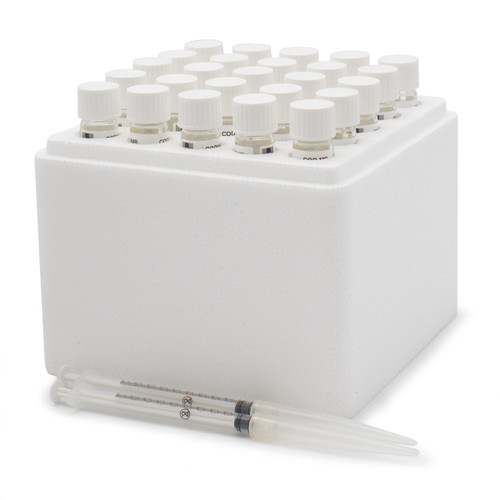
COD Medium Range Reagent Vials with Barcode, EPA Method (25 tests)
The HI94754B-25 are barcode reagent vials that follow the EPA approved method for the medium range determination of chemical oxygen demand (COD) using a compatible benchtop photometer. These high quality reagents are manufactured in our state-of-the-art facility and are clearly marked with the lot number and expiration date on each box for traceability.
- Pre-dosed reagents for ease of use
- Prepared with high purity chemicals
- Marked with expiration date and lot number for traceability
*Products classified as Dangerous Goods can only be shipped via ground.
The HI94754B-25 COD kit contains 25 ready-to-use, barcoded vials containing pre-measured reagents. These high quality reagents follow the EPA approved method 410.4. In this method, a heated digestion is required to oxidize organic matter in the sample. During the digestion, hexavalent chromium in the reagent is reduced to trivalent chromium. The amount of reduced chromium is then measured colorimetrically. The intensity of color is determined by a compatible photometer and the COD concentration is displayed in mg/L (ppm) O2. These reagents are designed to be used with samples that have an expected range of 0 to 1500 mg/L (ppm) O2.
Automatic recognition of barcoded samples is an exciting feature when using the HI94754A-25 reagent vials with a barcode compatible photometer. When inserted into the vial holder of the photometer, the sample method and range are automatically identified from the barcode. The barcode has four digits: the first two digits are for parameter identification and the second two digits are for reagent lot ID. Vials for different COD methods can be distinguished by a barcode printed on the vial - the barcodes for different methods are shown in the table below.
Comparison of Methods
EPA- The EPA approved method 410.4 for COD determination requires the use of mercuric sulfate (HgSO4). Mercuric sulfate is present in the EPA reagent vials to mitigate the interference of chloride in the measurement sample. This is a common requirement for wastewater treatment plants and food manufacturing facilities which tend to have higher concentrations of chloride present in their effluent. When using reagents that follow the EPA method, it is important to treat used vials as hazardous waste, as mercury waste requires recycling.
Dichromate - The dichromate method is adapted from the standard EPA and ISO methods for determination of COD, which are approved to measure COD concentrations ranging up to 1500 mg/L O2. For samples with expected concentrations in the high range of 0 to 15000 mg/L O2, the dichromate reagents can be used for accurate COD determination. It is important to treat used vials as hazardous waste, as mercury waste requires recycling.
Mercury-free - For those who do not wish to handle mercury reagents, our "green,in. mercury-free reagents are available for COD determination. These reagents are more sensitive to chloride interferences, as mercuric sulfate is not present. While the mercury-free reagents are easier to dispose of, they may be unacceptable for reporting purposes.
ISO- The ISO approved method 15705 for COD determination also requires the use of mercuric sulfate (HgSO4) to reduce the interference of chloride. Containing similar chemical reagents as the EPA method, it is important to treat used ISO vials as hazardous waste, as mercury waste requires recycling.
| Method | Parameter | Range (as O2) | Resolution | Accuracy | Reagent COD |
| EPA | COD LR | 0 to 150 mg/L | 1 mg/L | ±5 mg/L ±5% of reading | HI94754A-25 |
| Dichromate | COD HR | 0 to 15000 mg/L | 10 mg/L | ±150 mg/L ±3% of reading | HI94754C-25 |
| Mercury-free | COD LR | 0 to 150 mg/L | 1 mg/L | ±5 mg/L ±5% of reading | HI94754D-25 |
| ISO | COD LR | 0 to 150 mg/L | 1 mg/L | ±5 mg/L ±5% of reading | HI94754F-25 |





